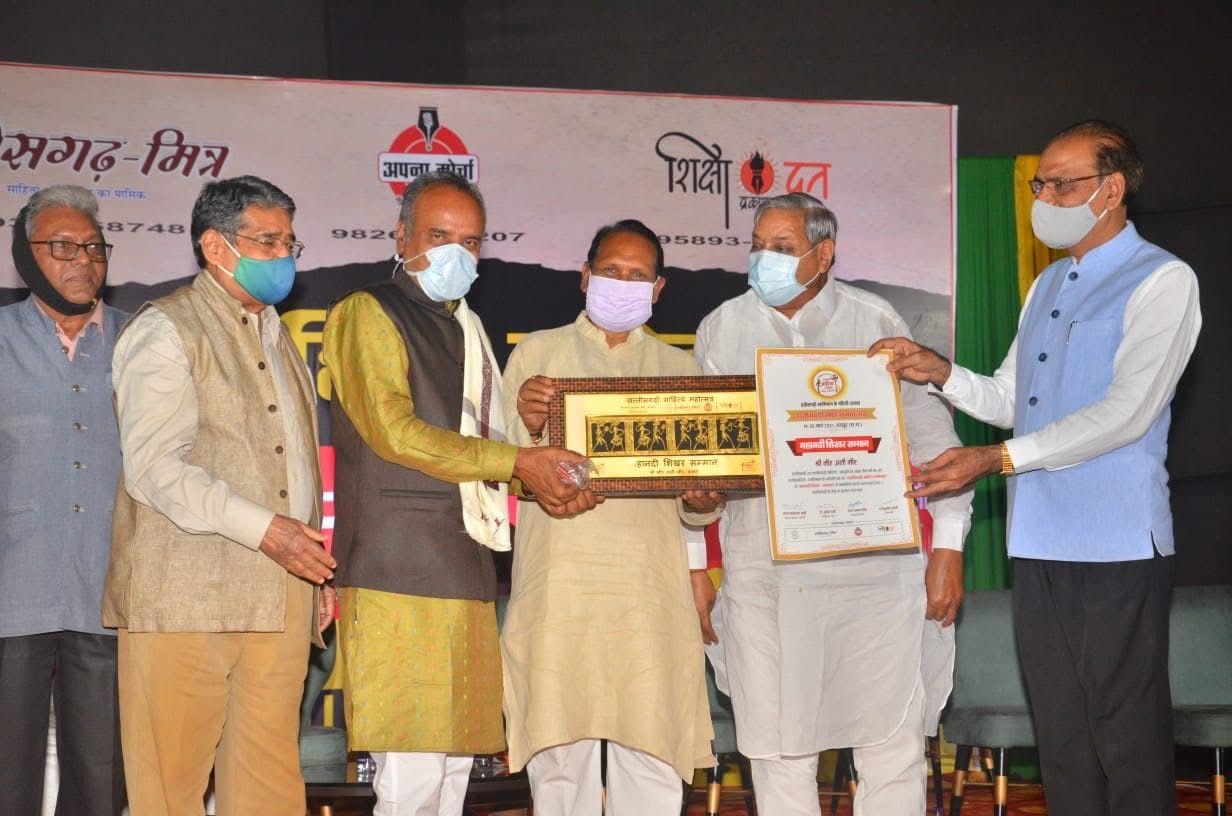
Mandakini Mishra/Raipur
When one thinks of poetry in Chhattisgarh, a familiar name instantly comes to mind: poet and lyricist Meer Ali Meer. His nameis Syed Ayyub Ali Meer, but he is celebrated in the world of Chhattisgarhi literature simply as Meer Ali Meer.
Renowned for blending humour, satire, ghazals, and folk songs with the natural rhythm of the Chhattisgarhi dialect, he is widely cherished as a “poet of the people.” He often recalls, “Chhattisgarhi came to me like mother’s milk,” a language he imbibed from his mother and grew up with in his village.
His poetry is marked by simplicity that hides profound truths. His ghazals explore love, longing, and life’s ironies, while his Chhattisgarhi compositions brim with the fragrance of folk traditions. His writings not only deepen pride in the language but also voice the pain, struggles, and sensitivities of ordinary people. More than a poet, he has become a tireless advocate for Chhattisgarhi literature, working passionately to connect younger generations with regional poetry.
.jpeg) Meer Ali Meer being felicitated
Meer Ali Meer being felicitated
Chhattisgarh has long been a fertile land of literature, art, and culture. Carrying this legacy forward, Meer Ali Meer is regarded with immense respect. Born on 15 March 1953 in Kawardha, he belongs to the group of writers who gave the Chhattisgarhi language a distinct identity. His father was Syed Rahmat Ali Meer and his mother Syed Sharifa Bano. After earning a B.A. and a C.P.Ed. degree, he devoted himself fully to literature.
His early education began in Kawardha and later continued in Raipur. Over the years, he has been honoured with the Pandit Sundarlal Sharma State Award and the State Literary Academy Award, along with countless recognitions at poetry gatherings and mushairas across the country. His poems capture the contradictions of society while also celebrating the humour of village life, bringing everyday speech and rural portraits vividly to life.
Meer Ali Meer’s literary journey started with ghazals and nazms. Drawn to poetry in his teens, he was deeply inspired by greats such as Mir Taqi Mir, Ghalib, and Faiz Ahmed Faiz. Yet he did not confine himself to Urdu or Hindi. By writing in Chhattisgarhi, he opened an entirely new dimension for the language.
 Meer Ali Meer being honoured
Meer Ali Meer being honoured
His works embrace the spirit of Chhattisgarhi culture—its festivals, folk songs, and epics. With striking clarity, his poems articulate the emotions and speech of common people. He believes literature holds meaning only when it reflects the pulse of society. For more than 25 years, his voice has reached people through Doordarshan, All India Radio, regional TV, and state-sponsored events.
Meer often credits Sant Pawan Diwan of Rajim’s Brahmacharya Ashram for motivating him. From childhood, he has woven life’s experiences into verse, focusing on social values and rural goodwill. He has shared stages at national, state, and regional poetry gatherings with nearly every leading poet of India, while also encouraging young poets of Chhattisgarh.
For his contribution to literature, he has been honoured by numerous institutions. In 2019, he received the Chhattisgarh State Alankaran Award. Many of his books and poetry collections have been published, further enriching the state’s literary heritage. He also heads the magazine Arun Choura and the Chetna Kala Sahitya Parishad in Kawardha.
Meer Ali Meer has recited poetry at prestigious forums including the Chhattisgarh Assembly (2012), Rajyotsav (2012), Nav Bharat Hasya Kavi Sammelan, Chakradhar Samaroh in Raigarh, Jajjaldev Mahotsav in Janjgir, Sirpur Mahotsav, Dongargarh Mahotsav, Bhoramdev Mahotsav, and the All-India Mushaira organized by the Chhattisgarh Urdu Academy.
ALSO READ: Tauqeer Raza breaks boundaries between politics, social work and business
Through his poetry and tireless promotion of the language, Meer Ali Meer has not only enriched the literary soil of Chhattisgarh but also carried its fragrance far beyond the state’s borders.
